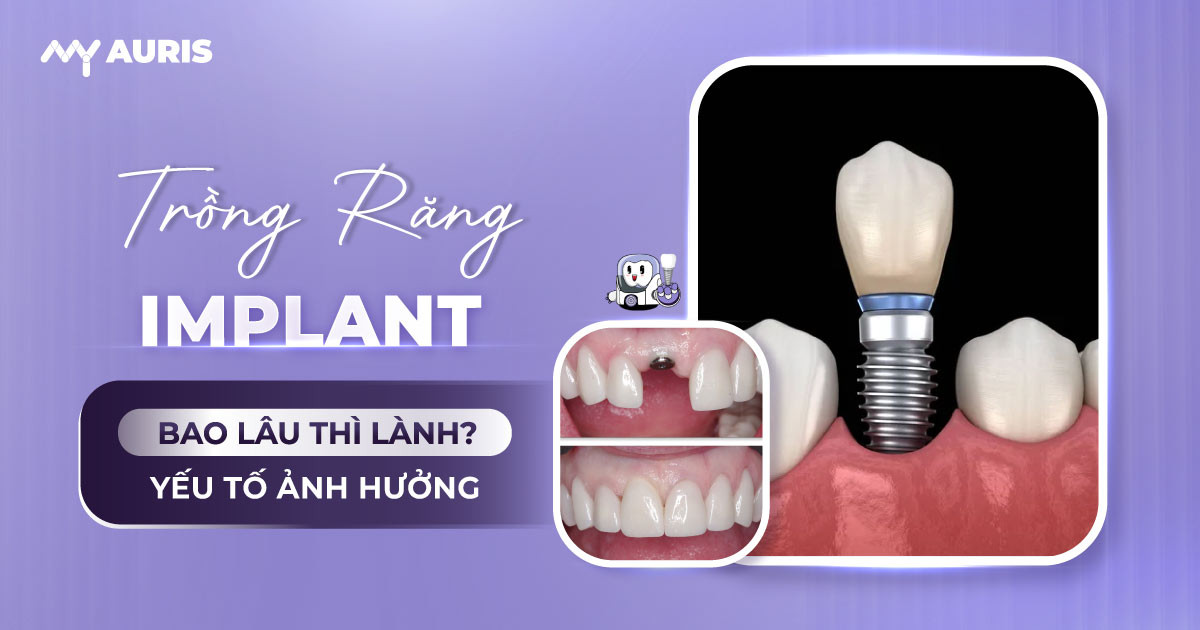Dental implant placement is a modern tooth restoration method, offering a durable solution for replacing artificial tooth roots. However, the implant healing time is a concern for many patients undergoing dental treatment.
What is Dental Implant Placement?
Dental implant placement, also known as implant surgery, is a method of restoring missing teeth by inserting a titanium post into the jawbone to replace the lost tooth root. Once the implant post fully integrates with the bone, a porcelain crown is attached on top, providing high aesthetics and stable chewing function similar to natural teeth.
Compared to traditional methods such as removable dentures or dental bridges, implant placement is a more complex technique as it involves intervention with gum tissue and jawbone. Therefore, this method requires highly skilled dental professionals, support from modern dental equipment, and strict sterilization procedures to ensure absolute safety.
Before the procedure, an oral and general health check-up is necessary to ensure suitability for implant placement. The implant post is placed independently at the missing tooth site without affecting adjacent teeth, helping to preserve natural jaw structure. This method can be flexibly applied to various missing tooth conditions, from single implant placement to full arch restoration.
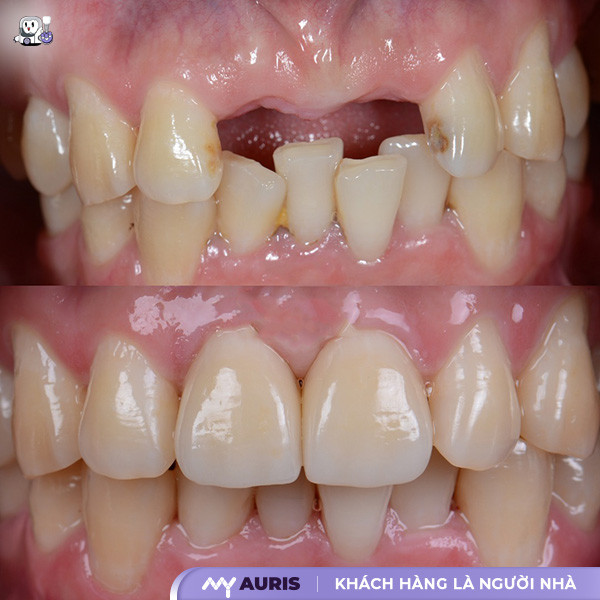
Who can get dental implants? Conditions & suitable candidates
Dental implant placement is a modern tooth restoration method that helps restore chewing function and aesthetics for people with missing teeth. To ensure optimal effectiveness, this method is only applied to patients who meet the necessary oral and general health conditions.
Cases suitable for dental implant placement include:
- Individuals with missing teeth, from a single tooth to a full arch (excluding wisdom teeth).
- Individuals with healthy and strong jawbones, suitable to support the implant post.
- Patients with stable general health, free from serious medical conditions such as cardiovascular disease, high blood pressure, or uncontrolled diabetes.
- Individuals who are not in a special health condition, such as recently having surgery, recovering from illness, or pregnant women.
Before undergoing dental implant placement, patients should inform their dentist clearly about their medical history (if any) to ensure a safe treatment process. The dentist will also provide detailed advice on the treatment duration and implant healing time, helping patients prepare thoroughly for the tooth restoration process.
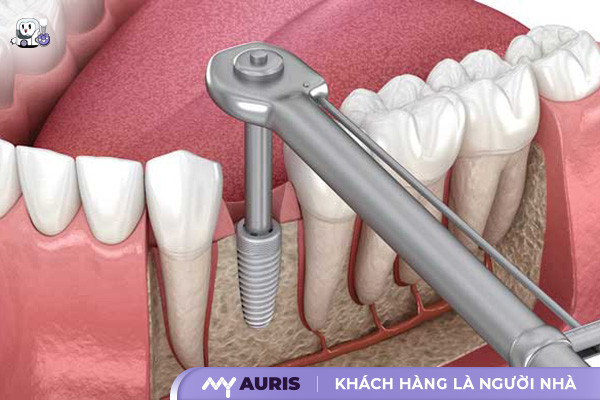
How long does dental implant placement take?
Dental implant placement is a modern tooth restoration solution that optimally replaces missing teeth. The actual implant placement procedure is quick, typically taking only 20 – 30 minutes per implant post. For more complex cases, this process might extend up to 40 minutes.
After the post is placed, the patient needs to wait 2 – 4 months for the implant post to fully integrate with the jawbone. Once the post is stable, the dentist will proceed to attach the implant crown, completing the implant restoration process, ensuring both aesthetics and chewing function.
Dental implants are designed with a structure similar to natural teeth, providing high implant durability. Thanks to their strong integration with the jawbone, implants can withstand powerful chewing forces, ensuring a natural and long-lasting chewing sensation just like real teeth.
How long does dental implant placement take to heal completely?
According to My Auris Dental Clinic doctors, the implant healing time is not fixed, as the process of implant integration into the jawbone depends on each patient’s individual body. This factor determines whether the post-implant recovery time is fast or slow.
First 3-4 days: After implant placement, patients may experience post-implant swelling and mild bruising, but these symptoms will gradually subside.
Integration phase: This is the period during which the jawbone grows around the implant post, creating a stable foundation for attaching the porcelain crown.
Next 2-6 months: Most successful dental implant cases will require this period to ensure the implant is stable and the implant wound fully heals.
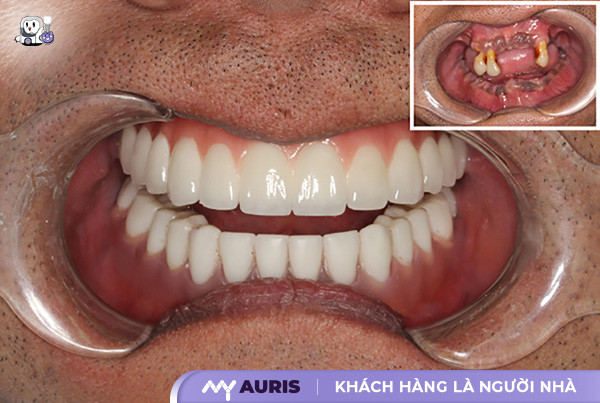
The healing process after implant placement – How long until swelling and pain subside?
After dental implant placement, the implant healing process goes through various stages. Here are the important timelines to note:
1 – 2 days after implant surgery: The implant area may show mild bruising and post-implant swelling and pain. This is a normal reaction and will gradually subside.
Next 3 – 4 days: Swelling and pain significantly reduce, and bruising also fades.
2 – 6 months of bone integration: The implant post will gradually stabilize in the jawbone. Once fully integrated, the dentist will place the abutment and attach the porcelain crown, completing the restoration process.
How long after implant placement can I eat normally?
The implant healing time is relatively long, so nutrition plays a crucial role in shortening the recovery period.
After 3 – 5 hours: Consume soft, cool foods, avoiding direct chewing in the newly implanted area.
During bone integration (2 – 6 months): Limit hard, chewy foods to avoid affecting gum tissue and implant stability.
Once the implant post is stable: You can resume normal eating, including harder foods.

Factors affecting healing time after dental implant placement
The implant healing process depends on various factors, ranging from the patient’s oral health and general health to the skill of the implant dentist and the dental clinic’s conditions. Below are the crucial factors determining the speed of recovery:
Oral health
Cases of long-term tooth loss often lead to bone resorption, requiring bone grafting or sinus lifts before implant placement. This prolongs the treatment and recovery time.
Patient’s general health
Individuals with medical conditions such as diabetes, cardiovascular disease, high blood pressure, or habits like smoking and alcohol consumption will have a longer healing time. In such cases, the dentist needs to conduct thorough examinations to ensure treatment safety.
Skill of the implant dentist
The skill of the implant dentist directly impacts the implant healing process. A skilled dentist will place the implant post accurately, minimize invasiveness, and help gum tissue and jawbone recover quickly. Conversely, an inexperienced dentist may cause implant complications, damage gum tissue, and prolong treatment time.
Supportive dental equipment
Modern dental equipment helps dentists make accurate diagnoses and create optimal surgical plans, thereby shortening implant placement time and reducing the risk of complications.
Sterile conditions during surgery
Sterilization plays a crucial role during surgery. If the environment is not adequately sterile, the risk of infection and implant rejection will increase, affecting health and prolonging treatment time.
Post-implant care
After surgery, proper post-implant care is a determining factor for healing speed. Patients need to follow the dentist’s instructions regarding diet, oral hygiene, and scheduled follow-up appointments to prevent implant complications.
Tips for faster recovery after dental implant placement
If you are wondering how long dental implants take to heal and want to shorten the recovery time, please note the following important points:
Choose implant posts that integrate quickly with bone
The quality of the implant post directly affects bone integration capabilities and the speed of implant recovery. Premium implant lines like Straumann Implants (Switzerland) and Nobel Implants (USA) have optimal designs that help the jawbone adhere faster, reducing implant healing time.
Immediate implant placement after tooth extraction
Immediate implant placement technique combines tooth extraction and implant post placement in a single implant surgery. This leverages the existing stable jawbone, limits bone loss, and promotes implant bone integration, leading to faster healing.
Adhere to the implant dentist’s instructions
To prevent implant complications, dentists recommend avoiding alcohol and tobacco for at least 1 month before and after implant placement. Additionally, proper post-implant care will help reduce pain, prevent infection, and optimize implant recovery time.
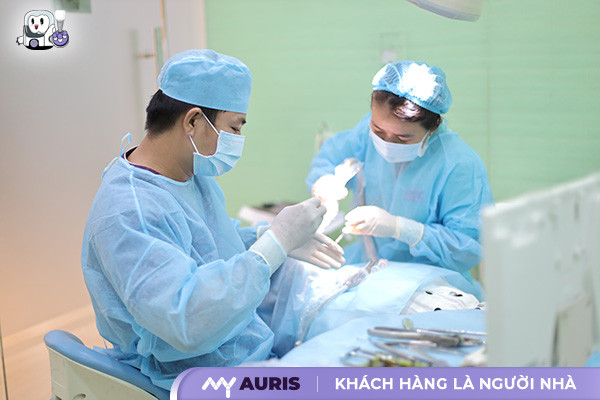
Safe and Fast Recovery Dental Implant Placement at My Auris Dental Clinic
When choosing dental implant placement, the primary crucial factors are the dental facility and the team of implant dentists. From the surgical technique to the dental equipment, everything needs to meet standards to ensure safe results and minimize risks during the implant placement process. Therefore, finding a reputable clinic is absolutely essential.
As a pioneer in the field of dental implantology, My Auris Dental Clinic is committed to providing safe implant treatment solutions, shortening healing time, and helping patients recover quickly.
Our highly specialized implant dentists have many years of experience and closely monitor each stage of treatment. They are well-trained in dental surgery, ensuring precise techniques and minimizing complications. The Sorina 3D imaging system and implant planning software support dentists in accurate diagnosis and execution. Our dental equipment meets international standards, ensuring quick and effective treatment. Modern, absolutely sterile surgical rooms prevent infection and cross-contamination. We use genuine imported implant materials from reputable brands, ensuring safety and long-term durability.
With standardized procedures, advanced equipment, and a dedicated team of dentists, My Auris Dental Clinic helps patients recover quickly from implants and shortens healing time. Especially after surgery, dentists provide detailed instructions on oral care, ensuring perfect results. Contact hotline 0906038017 now for consultation and to book an appointment with our specialists!


